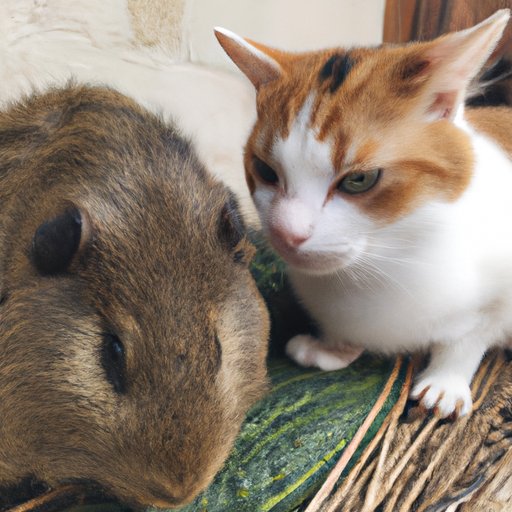Introduction
Cats and guinea pigs can be a tricky combination, and many people worry about the safety of their guinea pigs when introducing cats into the home. However, with careful observation and appropriate precautions, cats and guinea pigs can often peacefully co-exist. This article will explore the truth about cats and guinea pigs, what would happen if they lived together, the potential risks of feeding guinea pigs to cats, and ways to ensure safety between the two species.
The Truth About Cats and Guinea Pigs: What to Know Before Adopting Both
Cats are natural predators and have an instinctive prey drive, meaning they are hardwired to hunt for food. While cats can be trained to cohabitate with other animals, it is important to understand their natural tendencies before bringing them into a home with other pets.
When introducing cats and guinea pigs, there are several considerations to keep in mind. First, cats should always be supervised when around guinea pigs. Secondly, it is important to provide enough space for both animals to feel comfortable and secure. Finally, cats should never be allowed to access areas where guinea pigs are housed or kept, as this could lead to injury or death.
To ensure successful integration, there are a few tips to follow. First, it is important to introduce cats and guinea pigs gradually, allowing them to become accustomed to each other’s presence. Secondly, providing plenty of hiding spots and toys for both animals can help create a safe environment. Thirdly, providing enrichment activities such as puzzle feeders and cat trees can help keep cats entertained and away from guinea pigs. Finally, providing plenty of positive reinforcement when cats and guinea pigs interact calmly can help encourage peaceful cohabitation.
What Would Happen if a Cat and Guinea Pig Lived Together?
If a cat and guinea pig were to live together, there are certain signs to look out for that may indicate stress or discomfort. Guinea pigs may show signs of stress by panting, vocalizing, shivering, or hunching up. If these behaviors are observed, it is important to separate the animals immediately.
In addition to stress in guinea pigs, warning signs of aggression in cats should also be monitored. Aggressive behavior can include hissing, growling, swatting, or chasing. If any of these behaviors are observed, it is important to separate the animals immediately and seek professional advice.
It is also important to take certain precautions to ensure safety between cats and guinea pigs. Providing plenty of space for both animals to move freely and setting boundaries such as keeping cats out of guinea pig enclosures can help reduce the risk of injury. In addition, providing scratching posts, toys, and perches for cats can help keep them engaged and away from guinea pigs.
Is It Safe to Feed Guinea Pigs to Cats?
When it comes to feeding guinea pigs to cats, there are a few things to consider. Nutritionally speaking, guinea pigs are high in protein and fat, making them a good source of nutrition for cats. However, there are potential risks associated with feeding guinea pigs to cats, including the potential for parasites or diseases to be passed on. Additionally, guinea pigs are not a species-appropriate diet for cats, and it is important to consult with a veterinarian before feeding any type of meat to cats.
Can Cats and Guinea Pigs Co-Exist Peacefully?
Although cats and guinea pigs can be a tricky combination, it is possible for them to live together peacefully. Creating a safe environment for both animals is essential for successful cohabitation. Establishing boundaries such as keeping cats out of guinea pig enclosures and providing plenty of space for movement can help reduce the risk of injury. Additionally, providing enrichment activities for cats such as puzzle feeders and toys can help keep them entertained and away from guinea pigs.
Do Cats Eat Guinea Pigs? An Exploration of the Facts
Cats are natural predators, and understanding the types of prey they hunt can help us better understand their relationship with guinea pigs. Generally speaking, cats hunt small mammals such as mice, voles, and rabbits, as well as birds and insects. The size of prey cats hunt can range from very small (such as mice) to larger than themselves (such as rabbits).
When it comes to guinea pigs, cats may view them as prey depending on their size and the cat’s hunting instincts. Therefore, it is important to understand the natural prey of cats and how it relates to guinea pigs. Cats typically hunt smaller animals, so guinea pigs may be viewed as potential prey depending on the size of the cat and the size of the guinea pig.
Conclusion
Understanding the truth about cats and guinea pigs is important for keeping both pets safe. Through careful observation and appropriate precautions, cats and guinea pigs can often peacefully co-exist. It is important to remember that cats are natural predators and have an instinctive prey drive, and therefore must be supervised when around other animals. Additionally, providing plenty of space and enrichment activities can help ensure successful integration. Lastly, it is important to consider the potential risks associated with feeding guinea pigs to cats, and to consult with a veterinarian before doing so.
(Note: Is this article not meeting your expectations? Do you have knowledge or insights to share? Unlock new opportunities and expand your reach by joining our authors team. Click Registration to join us and share your expertise with our readers.)
